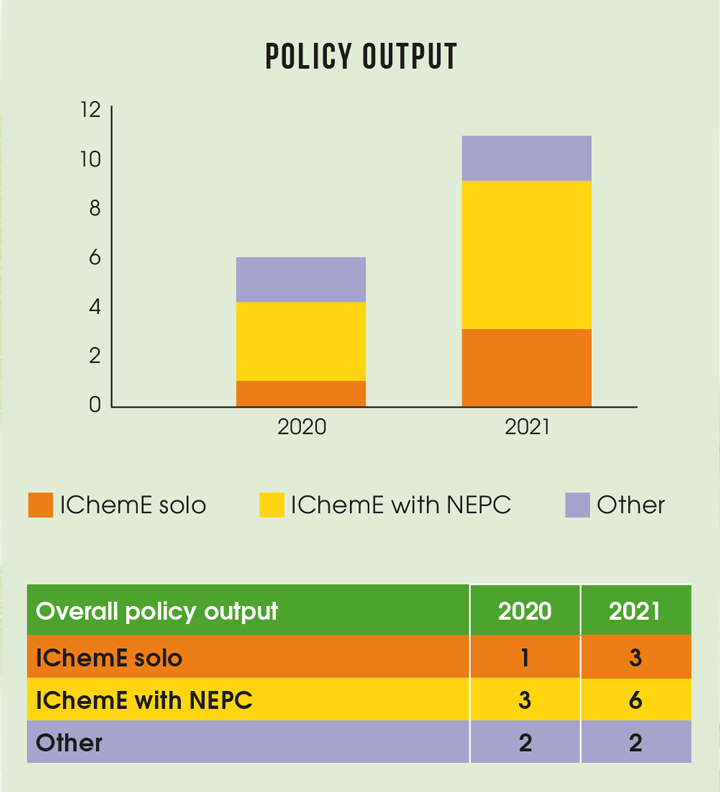Policy Progress
Alexandra Meldrum reports on IChemE’s increased involvement in policy consultations
CHEMICAL engineers are central to addressing many of today’s key issues. These include energy transition, climate change, asset security, emergency response, supply chains, circular economy, advanced manufacturing, digitalisation, economic recovery, productivity and innovation.
Our involvement is not just about technical skills; our society needs professionals who are skilled in systems thinking, responsible production and ethical leadership. Across the world, chemical engineers are seeking to address the Sustainable Development Goals (https://bit.ly/3pA3jAt), and the Grand Challenges for Engineering (https://bit.ly/3CcwaQo).
Through our learned society work, we provide thought leadership and scientific advice. Under our organisational charter, we take the position of a trusted scientific adviser.
IChemE has been active, and our policy output has almost doubled in the past 12 months.

To illustrate, here are a few examples:
In February 2022, IChemE responded to the Australian Government consultation on the Low Emissions Technology Statement 2022. Led by members in Australia, the response (https://bit.ly/3C8mred) demonstrates the need for a systems approach supported by skills to deliver emissions reduction through technology.
Through our learned society work, we provide thought leadership and scientific advice. Under our organisational charter, we take the position of a trusted scientific adviser
In March 2021, IChemE responded to the New Zealand Government draft advice from the Climate Change Commission. Led by members in New Zealand, the response (https://bit.ly/3pCuYAT) notes the alignment with IChemE’s position statement on climate change and the importance of emissions reduction.
Throughout 2021, IChemE has provided policy input to the UK Government through six policy responses written jointly with institutions through the National Engineering Policy Centre (NEPC). The Royal Academy of Engineering established the centre in 2020, with support from 38 organisations including IChemE, to provide a unified voice to policymakers and to enhance the influence of the engineering profession in government and increase the impact of evidence-based policy. For IChemE, the centre has greatly increased our capacity for high quality coordinated policy work in the UK with clear impact.
In the UK, 2021 policy work included:
- January: The role of hydrogen in achieving net zero (https://bit.ly/3trnGRF).
- July: Infection-resilient environments (https://bit.ly/3Mm3tFk) – advice on the strategic challenges and immediate measures for buildings.
- September: Six engineering ambitions for the UK Spending Review (https://bit.ly/3CbhIs6) – to deliver “Build Back Better”, the Government’s plan to support growth through investment in infrastructure, skills and innovation.
- September: Decarbonising construction (https://bit.ly/35ONHSV) – illustrates four interconnected drivers that could transform and decarbonise the built environment.
- November: Rapid ‘low regrets’ decision making for net zero policy (https://bit.ly/3KvmALN) – shows urgent steps for policymakers to impact decarbonisation.
Visit www.icheme.org/policy to read all of IChemE’s policy contributions.
Member contributions
Recent Editions
Catch up on the latest news, views and jobs from The Chemical Engineer. Below are the four latest issues. View a wider selection of the archive from within the Magazine section of this site.




